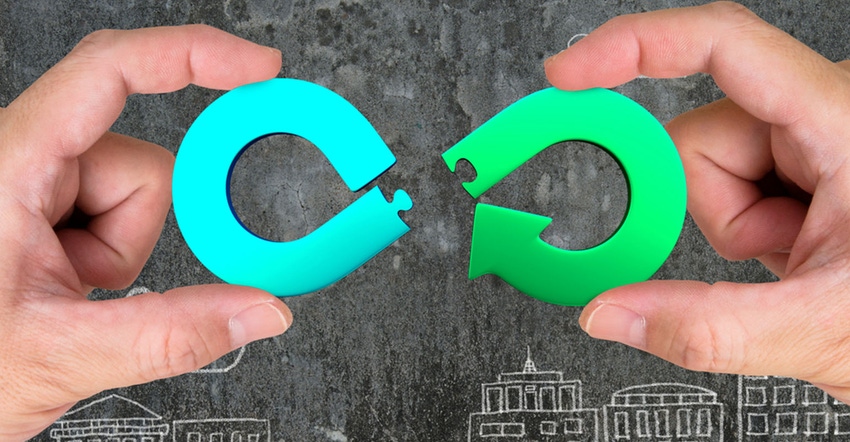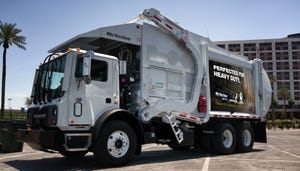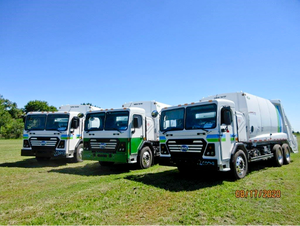A Snapshot of Closed Loop Partners’ Work to Advance a Circular Economy

Closed Loop Partners has worked for the past six years to try and advance a circular economy. Its business model includes a heavy focus on research and innovation, and multiple funding mechanisms to support and help scale circularity.
Georgia Sherwin, director, Communications & Strategic Initiatives, Closed Loop Partners, discusses how the firm supports innovation and harnesses collaboration to “reimagine” products and packaging. She touches on the organization’s current work with Starbucks, McDonald’s CVS Health, Walmart and other retail giants to create more sustainable materials. And she touches on a new acquisition that will expand Closed Loop’s footprint into the space of artificial intelligence-powered recycling.
Waste360: Can you give an overview of the umbrella organization, Closed Loop Partners, and brief us on the business model? And can you tell us about its evolution?
Georgia Sherwin: Closed Loop Partners was conceived in 2014. Ron Gonen, co-founder and CEO of the firm, had a vision to build a new economic model focused on a profitable and sustainable future that aligns the interests of shareholders, customers, local communities and the environment. Prior to Closed Loop Partners, Ron was the Deputy Commissioner of Sanitation, Recycling and Sustainability in New York City during the Bloomberg Administration. He oversaw the collection and processing of NYC’s paper, metal, glass, plastic, textile waste, electronic waste, organics and hazardous waste, as well as public policy.
Since 2014, Closed Loop Partners has evolved and grown to capture and maximize the growing market opportunity of circularity––estimated at $4.5 trillion by 2030. A circular economy prioritizes resource efficiency by eliminating waste and keeping valuable materials in play at their best and highest use case.
The firm is a unique hybrid business model, with an innovation center for research, analysis, and collaboration, alongside multiple investment funds, spanning venture capital, growth equity, private equity, and project-based finance. This enables us to meet companies where they are, providing an arc of capital that accelerates the growth of early-stage companies through to established companies. Each vertical of the firm builds upon another, bridging gaps and fostering synergies to scale the circular economy.
Waste360: Can you describe each of the components that fall under Closed Loop Partners?
Georgia Sherwin: I will start by describing the Center for the Circular Economy, the firm’s innovation hub, which executes research, analysis, and pre-competitive collaborations that advance the circular economy. This is where we identify bottlenecks and material challenges in the system, taking a holistic approach to innovating, testing, and scaling the circular solutions of the future. We harness design, innovation, and the power of collaboration to reimagine products and packaging for impact at scale, creating the systems change necessary for the advancement of the circular economy.
Currently, through the Center’s NextGen Consortium, we are working with Starbucks, McDonald’s and others to redesign the to-go fiber cup, so that the next generation of packaging can bring value across the system––to people, the planet and business. Through our Consortium to Reinvent the Retail Bag, we’re also collaborating with CVS Health, Target, Walmart, and others to reinvent the plastic retail bag so that it’s sustainable, affordable, and accessible. Single-use plastic bags are among the top 10 items found on beaches and waterways, and it’s estimated that we use 100 billion plastic bags per year in the U.S., contributing to a global waste challenge.
Now I will move on to the investment side of the firm. Under this, we house five funds.
Our venture capital arm, Closed Loop Ventures Group, focuses on investing in early-stage companies developing solutions for the circular economy.
For growth equity, we have our Fashion Fund, which looks to invest in innovative companies that deliver scalable solutions for a circular global fashion industry.
For project-based finance, our Infrastructure Fund focuses on bolstering recycling and circular economy infrastructure across North America, through below-market rate and zero-interest loans to municipalities and private companies.
Our parallel Beverage Fund seeks to improve the collection of the industry’s valuable plastic bottles.
Lastly, for private equity, we have our Leadership Fund, which focuses on acquiring and scaling businesses that keep packaging, organics, electronics, and apparel in circulation. Here we capitalize on the market opportunity created by a fragmented recycling industry in North America, combined with tailwinds of corporate customer demand and the clear economic opportunity for more resilient supply chains and resource efficiency.
Waste360: Tell us about your portfolio company Balcones Resources acquisition of Single Stream Recyclers
Georgia Sherwin: In 2020, the Closed Loop Leadership Fund’s portfolio company, Balcones Resources, acquired Florida-based Single Stream Recyclers (SSR), the first artificial intelligence-powered recycling company in the United States. The bolt-on acquisition represents Closed Loop Partners’ expanding footprint of best-in-class, modernized recycling facilities across the country.
SSR processes approximately 100,000 tons of residential single-stream material per year and by 2030 is projected to have diverted 1.2 million tons of material from landfills, resulting in 3.5 million tons of avoided greenhouse gas emissions. This is a critical step toward modernizing recycling systems in the United States in order to keep up with the evolving and growing “waste” stream, and capturing the value of metals, plastics, and other materials after use.
Waste360: Tell us about some of Closed Loop Ventures Group’s investments.
Georgia Sherwin: Last year, Closed Loop Ventures Group’s portfolio made significant strides.
Algramo, a Chile-based startup solving economic and environmental issues through vending machines that dispense staple household products “by the gram,” expanded into the United States––accelerating the growth of convenient and cost-conscious refill systems.
AMP Robotics recently raised $55 million in Series B funding to further develop artificial intelligence-based product applications that can increase recycling rates for recycling facilities, enabling the sortation of up to 80 items per minute.
The Renewal Workshop partnered with multiple leading retailers, including Coyuchi, The North Face, Pottery Barn, and Tommy Hilfiger, restoring imperfect and returned items to like-new quality––advancing repair and refurbishment models at scale. And recently, Thrilling joined forces with Black Owned Everything, promoting Black-owned vintage businesses across the country.
Waste360: How was the decision made to come up with each of these funds?
Georgia Sherwin: When Closed Loop Partners was founded in 2014, it was driven by the multi-trillion dollar potential of transitioning to a circular economy––the restructuring of the current linear economic model to eliminate waste and keep valuable materials in circulation for manufacturing supply chains. The vision for the company was to capture this significant opportunity, working together with key players to accelerate the transition––including innovators, startups, large companies and cities and governments across North America.
The creation of each fund thereafter has been driven by market forces, community and industry needs, and stakeholder alignment, focusing on sectors with the greatest opportunity for sustainability improvements and organizations with the largest potential for impact toward building the circular economy.
Waste360: How is Closed Loop Partners’ network leveraged to work with private companies? And how are you able to connect various stakeholders?
Georgia Sherwin: Investors in Closed Loop Partners include some of the world’s largest retail, technology, and consumer goods companies, as well as family offices and institutional investors. Across our network, and beyond our corporate partners and investors, we leverage industry experts and academic research, catalyze capital through co-investors, and hold ourselves accountable to leading standards set by our impact partners. Through this extensive ecosystem, we are in a unique position to connect municipalities, entrepreneurs, and investors in an effort to build stronger relationships and accelerate collective work toward the creation of circular supply chains.
Waste360: What is Closed Loop Partners’ overall strategy moving forward?
Georgia Sherwin: We continue to see ample opportunities for investment and innovation across all of the sectors in which we operate––plastics and packaging, fashion and beauty, technology and food, and agriculture. For example, it is estimated that $500 billion a year is lost due to wasteful practices within the fashion industry, yet the opportunity for the new use of recycled materials in the next few years is estimated at upwards of $350 billion. Exploring clean manufacturing through renew, repair, and resale models, among other approaches, could help us accelerate the circular fashion economy.
We will continue to work across sectors to capture the true value of the circular economy. Investment acts as the necessary driver to encourage innovation and enable transformative companies to bring their solutions to scale. And as investment flows into circular systems, opportunities for innovation continue to grow.
Waste360: So much has happened in the last several years, between China’s policies; and some other overseas markets becoming more stringent in their requirements; and in 2020, COVID-19.
How do these events affect Closed Loop Partners’ efforts to ensure domestic markets to support a circular economy, and how are you addressing the impacts?
Georgia Sherwin: The COVID-19 pandemic upended global health and safety, exacerbated the inequitable distribution of resources, and revealed the shortcomings of opaque global supply chains in a linear take-make-waste economy. On top of this, the escalating effects of the climate crisis laid bare the urgency to shift away from the status quo.
Now, more than ever, we have seen the importance of resilient systems and supply chains, and as a result, have worked relentlessly to strengthen the advancements that support this. In a resource-constrained world, resiliency lies with a transition to the circular economy––an economy that is efficient, transparent, local, and keeps valuable materials in play.
Waste360: What do you foresee being Closed Loop Partners’ most challenging work in 2021? How will the organization approach these challenges?
Georgia Sherwin: The continued proliferation of single-use plastics, exacerbated by the effects of COVID-19 and mounting PPE (personal protective equipment) waste, poses a serious challenge across the globe. Plastics are now found at the top of Mount Everest, swirling in the Great Pacific Garbage Patch, and even in our food. If we don’t take concerted action now, we will continue to see plastic waste cause harm to communities and the natural environment.
At Closed Loop Partners, we work across the entire system to address the challenge. There is no silver bullet solution. It’s critical that we use all of the tools in our toolkit to approach the challenge, starting with an overall reduction in the use of unnecessary single-use plastics. This can be achieved if we scale reuse models and harness design innovation and climate-friendly alternative materials where possible.
To address existing plastic waste, we must optimize our recovery infrastructure––leveraging new technologies like artificial intelligence and robotics to efficiently sort materials at recycling facilities––while also exploring advanced recycling technologies that tackle difficult to recycle materials like mixed-waste plastics, textiles, and single-use healthcare plastics.
We look to drive investment into the right kinds of solutions, whether that be below-market or zero-interest loans to help upgrade municipal or private recycling facilities with the latest technologies, or to support emerging sustainable material science or the growth of reuse models. Transitioning to circular practices across businesses ensures cost savings and creates value by keeping valuable resources in manufacturing supply chains. Our platform ensures we can meet companies where they are in order to scale success.
About the Author(s)
You May Also Like




